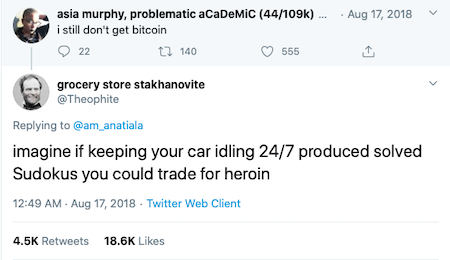Want to listen to this article?
Introduction
How would you explain the inner workings of bitcoin to a person in simple, understandable terms?
This explanation seems perfect to me because it illustrates some seriously problematic aspects of cryptocurrencies in one simple sentence.
It captures the unimaginable energy waste of mining cryptocurrencies. And it also captures the dark side of cryptocurrencies: facilitating crime.
At this point cryptocurrency enthusiasts are rolling their eyes and sigh. This point has been made many times over. I know, I'm definitely not the first to criticise cryptocurrencies1 this way.
I do have a simple challenge though:
Can you please show me the benefit to society of cryptocurrencies?
Please, don't come up with theoretical or future possibilities. Cryptocurrencies have existed for eleven years, they should have something to show for right now. After many hours of reading up on the topic, I have not been able to find any tangible benefits that would justify the effort and resources spend on them.
The downsides of cryptocurrencies are an entirely different matter. They are very, very clear to me. But let's not go there directly. What fun would that be?
The solution in search of a problem
As I see it, cryptocurrencies are entangled in a desparate search for a problem to solve. They are the answer to a question nobody asked2.
Many cryptocurrency advocates see the decentralised (distributed) nature of cryptocurrencies as a tangible benefit. Cryptocurrencies are most often not controlled by any government or single entity.
Aside from whether this is true in practice3, they seem to imply that it's a bad thing that governments control their own currencies. Well, last time I checked governments control their currencies to keep them as stable as possible. Frankly, that actually sounds like exactly what I would want from a currency.
Stability.
You can call cryptocurrencies many things but 'stable' is definitely not one of them. Cryptocurrencies are highly volatile. In cryptocoin, a loaf of bread could suddenly cost twice as much as the day before.
Although cryptocurrencies haven't seen any significant adoption as a payment method - due to their volatility - it has seen adoption in 'less stable countries' where it is basically the 'lesser of two evils'. I mean: you know things are bad if a volatile cryptocurrency is a safer option than the native currency of your country.
The argument in the end boils down to: if your society is already in serious trouble, maybe cryptocurrencies could provide 'some benefit'. If the people involved have reliable access to internet. And internet access is most often controlled by the government.
To my knowledge, cryptocurrency as a payment method has actually only seen true adoption within the world of dark markets such as Silk Road in wich bitcoin rose to prominence. Nonetheless, after eleven years, cryptocurrencies have no traction in the regular 'legitimate' markets as a real payment method.
The reason why is obvious: existing payment methods are much easier to use and feel much safer. And the volatility of cryptocurrencies only compounds to the support of these conventional methods.
If cryptocurrencies are a solution to anything at all they seem to be 'bad' solutions at best.
Are cryptocurrencies in fact a Ponzi or Piramid scheme?
It depends on the particular currency, but I think the case can be made for sure. I mean: why not both?
Cryptocurrencies have no intrinsic value. They are only worth what people are willing to pay for them. So the cryptocurrency advocates needed to drum up demand, to create a market where previously none existed. This resulted in wild visions of the future, elaborate jargon-filled smokescreens that argue cryptocurrencies would take over the world. Get in quickly or you miss out!
And so many people were afraid to miss out, creating an enormous cryptocurrency hype, starting in November of 2017, spilling into 2018 when the bubble burst. The end result? A few people got very rich and the vast majority lost money.
It seems to me this all is a combination of a ponzi scheme with the component of active recruitment found in piramid schemes. The value of the currencies must come from somewhere, right?
So please tell me how all of this benefits our society? Creating a handful of rich people at the expense of a lot of other people? Is that it?
The graveyard of dead cryptocurrencies only shows how many people or startups try to get a piece of the action. And so many of them are outright scams. Are in fact all cryptocurrencies scams at their core?
The downsides of cryptocurrencies
I hope I have established that cryptocurrencies provide no tangible benefits to society. But the do have a lot of downsides. I observe the following:
| Topic | Remark |
|---|---|
| Trafficing of illegal goods | Drugs, weapons, childpornography, and so on. |
| Trafficing of illegal services | Murder for hire |
| Tax evasion | - |
| Money laundering | - |
| Ransomware | Hold data hostage in encrypted form |
| Polution / energy waste | crypto miners use a lot of electricity |
| Lack of Security | several cryptocurrency exchanges have been hacked |
| Crypto scams | New cryptocoins are created just to scam people |
The easy retort to this table is: "'normal' currencies like the dollar or euro also facilitate almost all of those illegal things", which is true but it misses the larger point.
Those regular currencies provide tremendous value to our societies. Our societies are build upon them and they facilitate almost everything we do. The topics listed in the table are just a possible negative side-effect for regular currencies. Their clear benefits outweighs such downsides.
Cryptocurrencies don't seem to have any such upsides. They seem to be made to exclusively facilitate cryptocurrency speculation and crime.
Cryptocurrencies facilitate crime
I won't discuss all the topics in the previous table but I do want to highlight a few.
Dark markets
I think we all remember Silk Road, a now defunct darknet marketplace that allowed people to anonymously buy - amongst other things - drugs and guns4. Silk Road was the first large-scale application of bitcoin as a means of payment.
Silk Road started out with just drugs, but guns soon followed. This deeply depraved world of dark markets are very much enabled by cryptocurrencies because the parties involved in a transaction are so hard to identify.
Ransomware
Ransomware seems to be almost exclusively enabled by digital currencies. Not explicitly just cryptocurrencies, but they do enable this type of crime because tracing the payments back to the criminal is so difficult.
The damage caused by ransomware is so obviously devastating. You can have many opinions on the fact that many critical organisations such as hospitals or universities don't have their computer security under control.
The real problem is that cryptocurrencies make these kinds of attacks on businesses and institutions very low-risk and highly profitable. In my own country a university was targeted by such an attack and allegedly they paid the ransom. The disruption to its services was substantial.
Energy waste
As cryptocurrencies rose in value, it started to become profitable to 'mine' them. It started out with regular computers, but soon, we could use videocards to accelerate cryptocurrency mining, which are very power hungry.
Later on, FPGAs and ASICS were build to further accelerate mining performance. Entire companies spun up to build those miners and host them in large datacenters with cheap electricity. The scale of the operation is rather enormous.
According to an article dating to July 2019, just bitcoin mining consumes more electricity than Switzerland. The article links to an online tool that tracks this power usage in real-time based on some estimates.
It's just mind boggling to me that so much energy is wasted, so much pressure is put on the environment, for absolutely no clear benefit at all.
Closing words
So in short, I think that cryptocurrencies provide nothing of value to society. They do however facilitate crime and contribute to climate change.
Therefore, I would propose to shut them all down.
The complex technology behind the cryptocurrencies attracted a lot of otherwise smart people and I think it's a sad thing to see their efforts going to waste or have a negative impact.
People are not obliged to work on something valuable, but at least may I ask that they choose to work on something that won't harm our society?
Link to hackernews, where this post was quickly flagged down. The few comments that exist don't seem to really provide any answers to the question I pose.
-
I would definitely recommend reading this long-form-article by The New York Times. ↩
-
Unless you want to embark on a path of criminal activity. ↩
-
As mining is no longer profitable for the larger community, the miners become a small concentrated group of entities controlling the currency, making the currencies more centralised. Furthermore, the cryptocurrency exchanges where you can convert the cryptocurrency into regular money, are centralised institutions backed by for-profit companies. And those companies have to abide by the law. They are under the influence of the government. ↩
-
If you want to know more about what happend to Silk Road and it's founder - 'the Dread Pirate Roberts', I would recommend the book 'American Kingpin' by Nick Bilton. (no affiliate links) ↩




Comments